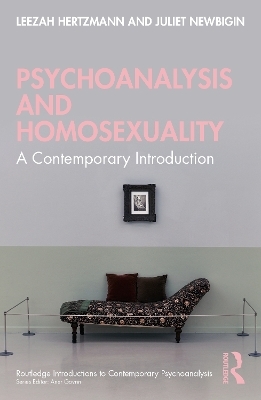
Psychoanalysis and Homosexuality
Routledge (Verlag)
978-1-032-22098-7 (ISBN)
This important book examines the ways in which same sex desire, or "homosexuality" has been theorised by psychoanalysis during its history to date and the impact of that on clinical practice.
The authors explore a brief history of the developing social attitudes which influenced the evolution of psychoanalysis, from Freud’s radical questioning of psychosexuality, to the later developments that assumed a moral high ground for heteronormativity and led to the diagnosis of other forms of sexual expression as perversions requiring treatment. The book elucidates contemporary developments in psychoanalytic thinking about sexuality from a post-heteronormative standpoint, including an examination of how heteronormative bias has relegated lived sexual experience to the sidelines. The book challenges this bias and introduces new ways of using psychoanalytic ideas as well as illustrating their relevance to clinical practice. Drawing on vignettes, the authors describe current challenges that clinicians face and discuss the dilemmas that these challenges present, both for qualified clinicians as well as those in training.
By approaching "homosexuality" from a contemporary post-heteronormative position, the authors advocate a more flexible encounter in the consulting room in a way that can illuminate an understanding of all sexualities, including heterosexuality.
Leezah Hertzmann is principal couple and individual psychoanalytic psychotherapist at the Tavistock and Portman NHS Foundation Trust (London, UK) and in private practice. She has a career-long interest in psychoanalytic theory and technique with LGBTQ+ individuals and couples and is a member of the British Psychoanalytic Council's Advisory Committee on Sexual and Gender Diversity. She has been the recipient of two British Psychoanalytic Council awards: one in 2015 for innovation in relation to developing evidence-based interventions for couple conflict/violence, and the second in 2019 with Juliet Newbigin, for Psychoanalysis and Diversity. Leezah teaches and publishes widely. Juliet Newbigin is a psychoanalytic psychotherapist with a long-standing interest in the impact of the wider social context on the development of individual identity within the family. She has been particularly concerned about the troubled history of the heteronormative understanding of sexual orientation in both psychoanalysis and Jungian analysis, and their failure to recognise the experience of the LGBTQI community. She has twice been given the BPC’s Bernard Rattigan Award for Psychoanalysis and Diversity, in 2015, jointly with Frank Lowe, and in 2019 with Leezah Hertzmann. She currently chairs the British Psychoanalytic Council’s Advisory Group on Sexual and Gender Diversity.
Introduction 1. The social origins of the concept of homosexuality 2. Freud and the evolution of his theories of sexuality 3. Psychoanalysis and homosexuality after Freud 4. Internalised homophobia and shame 5. Clinical challenges Postscript: The past, present and future; Public apology of the Finnish Psychoanalytic Society; British Psychoanalytic Council statement of regret January 2021; American Psychoanalytic Association issues overdue apology to LGBTQ community
| Erscheinungsdatum | 20.03.2023 |
|---|---|
| Reihe/Serie | Routledge Introductions to Contemporary Psychoanalysis |
| Verlagsort | London |
| Sprache | englisch |
| Maße | 129 x 198 mm |
| Gewicht | 317 g |
| Themenwelt | Geisteswissenschaften ► Psychologie ► Psychoanalyse / Tiefenpsychologie |
| Medizin / Pharmazie ► Medizinische Fachgebiete ► Psychiatrie / Psychotherapie | |
| Sozialwissenschaften ► Soziologie ► Gender Studies | |
| ISBN-10 | 1-032-22098-8 / 1032220988 |
| ISBN-13 | 978-1-032-22098-7 / 9781032220987 |
| Zustand | Neuware |
| Haben Sie eine Frage zum Produkt? |
aus dem Bereich


